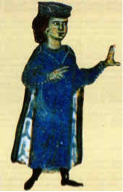 William IX, Duke of Aquitaine, besides his failed attempts to be a great leader of his people during the Holy Land Crusade of 1101, was a lyric poet in the vernacular style and is generally believed to be the first of the troubadour performers. He wrote in the Occitan language, an ancient tongue that still survives today in the Mediterranean regions.
William IX, Duke of Aquitaine, besides his failed attempts to be a great leader of his people during the Holy Land Crusade of 1101, was a lyric poet in the vernacular style and is generally believed to be the first of the troubadour performers. He wrote in the Occitan language, an ancient tongue that still survives today in the Mediterranean regions.
He was born on the 22nd October 1071, the son of King William VIII of Aquitaine and the noblewoman Hildegarde of Burgundy. The birth was, at first, controversial due to doubts about the infant’s illegitimacy and his father had to make a pilgrimage to Rome to resolve any doubts about both his son and his marriage to Hildegarde. The King died when William was 15 years old and he then, of course, inherited the Duchy of Aquitaine. Some reports later suggested that he married, possibly the following year, though more recent research suggests that this may have been inaccurate. More likely to be true is that he did marry, in 1094, an heiress from Toulouse by the name of Philippa and she bore him two sons and five daughters.
Military matters were very much to the fore at this time and William took up an invitation to join the Crusade of 1101 in the Holy Land but his skills as a leader were severely wanting. He barely escaped with his own life and lost most of his soldiers at various times. During the following years he was at odds with the church on many occasions and was actually excommunicated twice for a variety of “misdemeanours”.
While it is a fact that many dukes and kings throughout history are known for their military prowess, William is known for his writing skills as a troubadour. He wrote poems and songs in the Romance vernacular language and performed them to invited audiences. An early poem was called

and appears to be his musings about mortality. Here are the closing lines:

Many of his poems and songs survived and are still read and sung today. He wrote about the feudal political systems of the day but he also liked to describe everyday matters such as sex and love, including his own successes with women. His work is often cited as being written by the Count of Poitiers, but this was undoubtedly his own hand that produced the work. During the 13th century a vida (biographer, usually of troubadours) wrote of William:

Of course much of what was written about him could be based on legend or misinterpretation of his work. William loved to portray himself as a great lover so the truth of these events may be a little obscure. He was certainly a witty and vivacious writer who provoked scandal and admiration in almost equal proportions. When performing he had his audiences gasping at times with the coarseness of his words. Perhaps he, himself, felt that he sometimes went too far and was known to be a generous benefactor of the church, presumably hoping to regain papal favour. It is believed that he was, in fact, welcomed back to the church around the year 1120.
William IX, Duke of Aquitaine, died on the 11th February 1127 at the age of 55.

